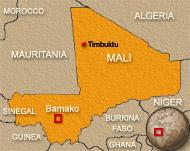Timbuktu manuscripts go on display
Ancient manuscripts from Africa’s desert north, appearing in public for the first time, have gone on display in Johannesburg after President Thabo Mbeki launched an appeal for funds to save a vital element of African cultural history.

The manuscripts are from the National Ahmed Baba Centre for Documentation and Research in Timbuktu in Mali, which was once an important cultural crossroads that attracted scholars from far afield in the African and Arab worlds.
Experts say documents kept at the centre, some dating back to the 13th century and finely illuminated, are important because they show that Africa had a long written tradition rather than, as is commonly supposed, an oral one; and that African culture was alive and vibrant long before the European Renaissance.
“This is the first time these manuscripts have left the institute,” said the director of the establishment, Mohamed Gallah Dicko. “They never leave for reasons of preservation and security.”
Hi-tech preservation
Of the 25,000 manuscripts at the centre, 16 have gone on display at the Standard Bank Gallery in the heart of Johannesburg, where the exhibition was opened by Mali President Amadou Toumani Toure on Saturday.
 |
|
Toure: The project is part of an |
The documents on display there include a biography of Prophet Muhammad along with treatises on music, astronomy, physics and traditional pharmacy.
“We wanted to show that contrary to what people sometimes think, the manuscripts do not all deal with Islam,” Dicko said.
He said the modest 1970 building where the manuscripts were kept was not suitable for hi-tech conservation, and that a new centre of international standard would be constructed with the results of the cash appeal.
Integral history
Mbeki launched the appeal at a gala dinner in South Africa, as part of the first joint cultural programme under the New Partnership for Africa’s Development (NEPAD), which encourages collaboration between governments, state institutions and the private sector.
“Clearly, we cannot allow such a critical part of African history to die, because such a death would mean erasing an important link to our glorious past” Thabo Mbeki, |
“Clearly, we cannot allow such a critical part of African history to die, because such a death would mean erasing an important link to our glorious past,” Mbeki said.
He added that translation and publication of some of the manuscripts would help renew a sense of self-respect and pride in Africa.
The appeal aims to raise 35 million rand ($5.6 million) as part of a joint programme begun in 2003, to ensure the Timbuktu manuscripts will always be available as part of Africa’s heritage of literature and science.
Riason Naidoo, director of the project at the South African Ministry of Arts and Culture, said 20 million rand would go to constructing a new centre that would be proof against sun, wind, rain, sand and insects, and a further 15 million would be spent on training a dozen experts to work there.
Naidoo said the project was an ideologically inspired part of a “south-south project to help each other”.
Knowledge
Since 2003, a dozen Malian restorers have come to South Africa each year for two-month training courses, while South African experts go to Timbuktu to advise families that own historic manuscripts.
 |
|
Centuries ago, people flocked to |
“There are more than 100,000 manuscripts kept in five private libraries or owned by numerous families in Timbuktu,” he said.
“People are very attached to them. Some know what they contain. But whether they know or not, they keep them as precious family heirlooms.”
President Toure hailed the project as part of an “African Renaissance”.
“Once upon a time, people came from all over the world to Timbuktu in search of knowledge,” he said. “But today the means of Mali are very limited.”